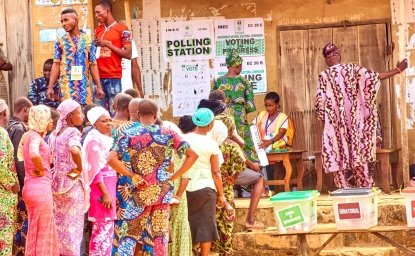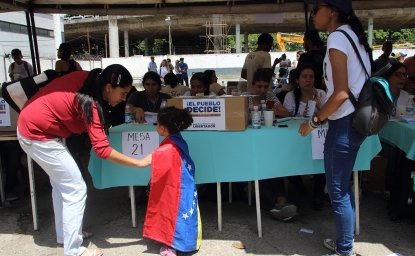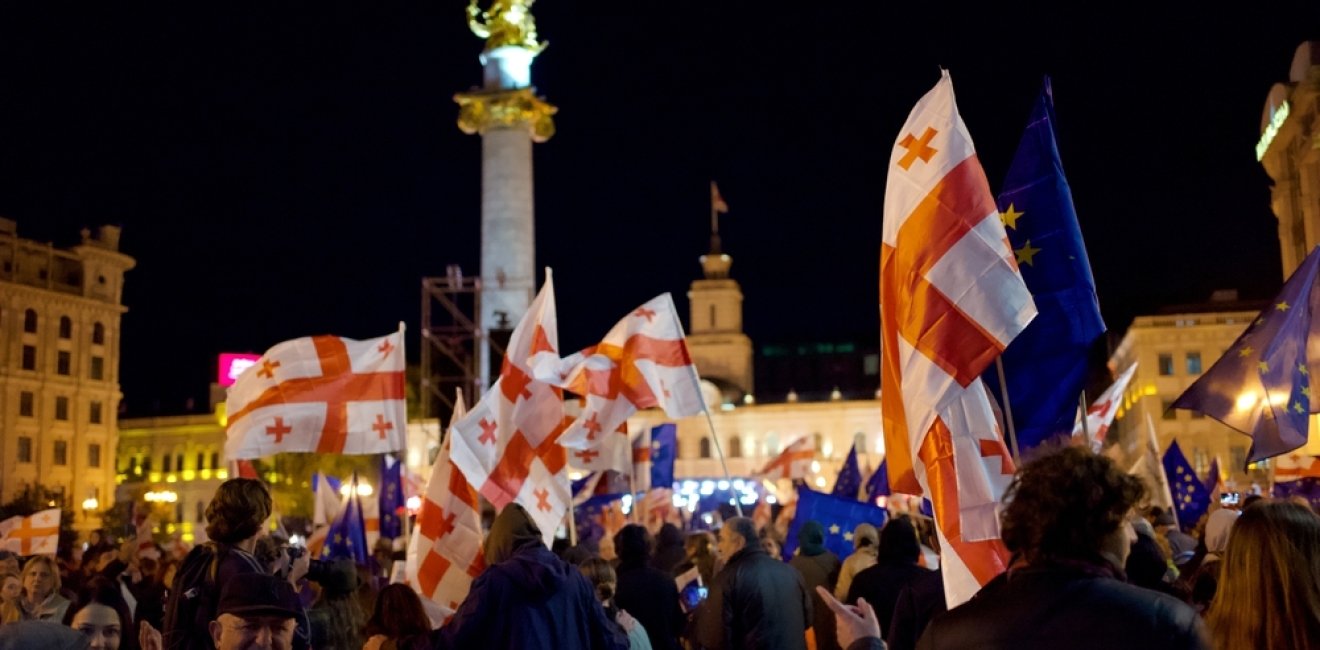Widespread unrest has gripped Tbilisi and other cities across Georgia, a small but strategically significant nation in the South Caucasus that was a Soviet Union republic from 1921 to 1991. More than 100,000 protesters have taken to the streets facing increasingly heavy-handed response from the police. According to the public ombudsman, Levan Ioseliani, who represents the ruling party, 80 percent of those detained have reported being subjected to violence by the police. Social media are filled with pictures of well-dressed people with injuries, as Georgians always dress nicely for their protests.
Reports have emerged of police raids targeting the offices of opposition parties and activist groups in Georgia. Among those detained is Nika Gvaramia, the leader of the “Coalition for Change,” along with several other opposition figures. Authorities are also reportedly pursuing individuals managing social media groups linked to organizing and mobilizing protest movements
For many Georgians, the promise of a European future seems to be slipping away, following the government’s announcement last week that it would suspend the country’s effort to join the EU. “We made the decision not to put the accession negotiations with the European Union on the agenda until the end of 2028,” Prime Minister Irakli Kobakhidze said last Thursday.
Georgia’s European Path Derailed
This statement came in response to the European Parliament’s motion calling for Georgia’s recent election to be re-run within a year under international supervision. Earlier, in July 2024, the EU suspended the admission process for Georgia and froze part of its financial aid, including €30 million allocated to the Georgian Defense Ministry. Brussels cited the Georgian Dream–sponsored law on Transparency of Foreign Influence (“foreign agents law”) and the “anti LGBTQ+ propaganda” law, both of which EU authorities claim violate key conditions for membership.
In a recent election, the first since the country achieved EU candidate status in December 2023, the ruling Georgian Dream party claimed victory against the background of protests. Most observers and many foreign governments condemned the elections as neither free nor fair. The results were even challenged in court by the president of Georgia, Salome Zurabishvili (the appeal was rejected). Though her role is largely ceremonial, Zurabishvili has emerged as a significant figure, being the only high-ranking official to openly dissent from the government’s current course. Months before the election, Bidzina Ivanishvili, the country’s effective ruler and the honorary president of Georgian Dream, made his intentions explicit. He promised to clean Georgia of “agents from abroad”—that is, the opposition parties. It was a credible threat, especially since the leader of the largest opposition party, Mikheil Saakashvili, was already imprisoned.
Meanwhile, the opposition too has effectively accused the government of falling under hostile foreign influence—namely, Russia’s. The widening gap between the Tbilisi government’s policies—seen as increasingly aligned with Moscow—and the aspirations of a population striving for closer ties with the West has ignited waves of protests. Joining the EU is highly popular in Georgia. According to a National Democratic Institute poll released last December, 79 percent of those polled expressed support for EU membership.
On Sunday, Prime Minister Irakli Kobakhidze attempted to walk back his earlier comments, telling a BBC correspondent, “We have not suspended anything, it’s a lie.” Despite his statement, the protests have shown no sign of subsiding, with clashes between demonstrators and police continuing for a sixth consecutive night.
The political crisis in Georgia began brewing in early 2023 when Georgian Dream first attempted to pass the foreign agent law. Massive protests filled the streets of Tbilisi, forcing the government to retreat. A year later, in the spring of 2024, the law was reintroduced in parliament, triggering another wave of protests. This time, however, the government cracked down on the rallies and pushed forward with its plan.
Curiously, as recently as two weeks ago, Georgian Dream maintained its formal commitment to joining the EU “by 2030,” a claim that neither European leaders nor Georgia’s pro-Western advocates took seriously. Despite its rhetoric, the government’s actions appeared calculated to irreparably damage relations with the EU just ahead of general elections. An eerie parallel is hard to escape. Eleven years ago, also in November and also under Russian pressure, the then president of Ukraine Vladimir Yanukovych, suddenly pulled out of the EU Association agreement. This started the Maidan and soon led to Yanukovych’s downfall.
The Georgian Predicament
To say that Georgians aspire to be part of Europe rather than aligned with Asia and Russia is an understatement. Georgia was one of the first nations beyond Europe’s geographic boundaries to embrace Christianity. Many of its classical texts and translations—predominantly religious—were produced in Byzantium or Bulgaria, long before the emergence of Russia or the Russian literary language. The fall of Constantinople in 1453 severed the last tenuous connection between Georgia and the broader Christian world, leaving a lasting cultural and historical trauma that continues to shape the national identity.
The idea of “joining Europe” is not a recent trend. It has been a cherished aspiration for generations of Georgian intellectuals. In Mikheil Javakhishvili’s novel Kvachi Kvachantiradze—whose author was exiled under czarist rule, sentenced to death under Lenin, and ultimately executed by Stalin—a character gazes at British ships leaving Batumi in 1920 and laments: “We are alone again in Asia.” The quote, recently highlighted by a prominent commentator on Georgian affairs, captures a sense of historical isolation.
It is worth recalling that the Bolshevik invasion of Georgia occurred just days after the newly independent country received diplomatic recognition from the major powers of the day. The dream of sovereignty was extinguished for another 70 years, further embedding the longing for European ties in the Georgian national psyche.
The years of independence have been tumultuous, yet Georgians have achieved significant milestones, including visa-free travel to the EU (2017) and EU candidate status (2023). The EU recently became Georgia’s largest trading partner, surpassing Turkey (no. 2) and Russia (no. 3), even though the country’s only substantial land trade route connects the latter two. Open borders have enabled many Georgians to work and spend money in Europe, while also facilitating substantial financial assistance. Hundreds of millions of euros in aid have flowed into a country with a budget of just under €10 billion a year.
The funds were primarily allocated to areas critical for EU accession, such as infrastructure development and the training of government officials. When Georgian Dream introduced the foreign agent law, it implied that European aid was directed at NGOs aiming to influence Georgian domestic politics. But that was never true: the ten largest recipients of European aid are all government agencies, often engaged in apolitical tasks such as road construction. By contrast, grants to NGOs are negligible in scale.
Of course, the protests are not truly about funding. The real reason lies in a sentiment that has persisted for over a thousand years. Georgians have always considered themselves part of Europe, whether defined by Christendom or by the modern secular union. This was true a millennium ago, when they sought alliances with Crusaders. It was true a century ago, when they formed a Georgian regiment to fight for independence with German support. It was true when they welcomed Fridtjof Nansen on his journey from Batumi to Yerevan. And it remains true today, as they strive for EU accession. For Georgians, this is a matter of values, not money—even though Bidzina Ivanishvili, with personal wealth equivalent to a third of the country’s GDP, can offer far more material aid than the EU.
The difference now is that, unlike in earlier times, Georgians are more visible to the Europe they seek to join. They are also more seasoned, having successfully led a bloodless revolution less than 20 years ago.
The opinions expressed in this article are those solely of the authors and do not reflect the views of the Kennan Institute.
Author

Journalist; Host of “Snova Nikogda” podcast

Kennan Institute
The Kennan Institute is the premier US center for advanced research on Eurasia and the oldest and largest regional program at the Woodrow Wilson International Center for Scholars. The Kennan Institute is committed to improving American understanding of Russia, Ukraine, Central Asia, the South Caucasus, and the surrounding region though research and exchange. Read more

Explore More
Browse Insights & Analysis
Navigating the New Cold War: US-China Relations Post-Election

Democratic Governance in Africa: Trendlines and Transformations


